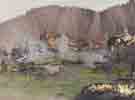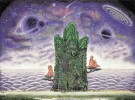戴卓群:这样很容易迷恋在一些很表层的东西上。
Dai: This makes it easy to get caught up in the superficial level.
张小涛:这次我让团队把很多华丽的东西都去掉,要朴素、要含、要藏在里面,四两拨千斤,有很多技术手段可以用,但心灵的力量更重要。我这次动画里也加了些手绘的语言,我不愿意把动画做成绘画的延续,翻开的经书里面有绘画的痕迹,比如出土的器皿、佛像、经书、灰烬、风声、水声的音效都会运用在其中。
Zhang: This time I had the team remove a lot of the fancy stuff. It should be simple, reserved, concealed. Less is more. A lot of technical methods can be used, but the spiritual power is more important. In this animated film I also added a lot of painterly language. I don’t want animation to be a continuation of painting, but when the sutras are opened you can see the marks of painting, and it is also applied with the relics, the Buddha sculptures, the scriptures, the ashes and the sound effects such as the wind and water.
戴卓群:萨迦那个地方如今的情况是怎样的?
Dai: What is Sakya like now?
张小涛:记得我们在萨迦县半夜里起来登山到尼姑庵去听早课的真切感受,远处有犬吠、人声、风声交织在一起,皓月当空让我想起了:“月朗星稀,朱雀南飞”的句子来。清晨尼姑庵里浓浓的酥油茶味道和早课诵经的声音交织在一起,我们很难分辨这种视觉、嗅觉、听觉混合的复杂感受。老尼们沉吟低唱、苍茫枯寂,如海潮之音绵延不绝,梵音穿越了时间的暗河,那一刻犹如沧海行舟,暗夜登山。
Zhang: I remember we were in Sakya County and we got up in the middle of the night to climb the mountain and listen to the morning class at the nunnery. It was a distinct experience. In the distance you could hear the sounds of dogs, people and the wind mixing together. The bright moon in the sky reminded me of the verse, “the moon hangs among the sparse stars / the vermilion bird flies south.” In the nunnery at dawn, the thick smell of yak butter tea and the sounds of the sutra chanting wove together. I couldn’t quite distinguish this complex mix of sight, smell and sound. The older nuns chanted the low notes, a boundless sound that spread out like the waves in the sea. The sounds of the chants spread out across the river of time. It was like traversing the vast seas or climbing a mountain in the dark of night.
戴卓群:你说萨迦与佛教世俗化的进程有关,那么到今天,到了一个怎样的状态,可能许多人并不了解。
Dai: You said that Sakya was connected to the secularization of Buddhism. What is its situation today? Many people probably don’t understand.
张小涛:公元13世纪初期,以成吉思汗为首的蒙古部落兴起,到他的孙子忽必烈统一全中国,建立元朝中央政府后,封八思巴为“帝师”,赐玉印“命统天下释教”,即管理全国佛教事务,并协助中央政府管理西藏,统领西藏十三万户,八思巴遵忽必烈所嘱,在西藏清查户口,制定法律,于1268年在萨迦正式建立起与中国其它行省相同结构的地方政权,八思巴成为隶属于元朝中央政府的西藏地方行政长官,萨迦派势力达到鼎盛时期。14世纪后半叶,随着元朝的灭亡,萨迦派在西藏的地位被噶举派取代,但该派仍然维持下来。
Zhang: The Mongolians rose in the early 13th century under the command of Genghis Khan. Under his grandson, Kublai Khan, they united all of China and established the Yuan dynasty. Kublai bestowed the title of viceroy to Chogyal Pakpa, with the mission of “spreading Buddhism through the world.” He was in charge of the nation’s religious affairs, and coordinated the government’s rule over Tibet, controlling 130,000 families. Under orders from Kublai Khan, Chogyal Pakpa carried out a census in Tibet, set laws, and established a regional government at Sakya in 1268 that held the same authority as a provincial government. Pakpa became the administrator of Tibet under the Yuan dynasty government, and the Sakya Sect reached the peak of its influence. With the fall of the Yuan dynasty in the 14th century, the Sakya Sect’s position in Tibet was replaced by the Gelug Sect, but the Sakya Sect survived.
“政教合一”改变了西藏的命运,吐蕃时期的战斗力非常强悍,唐朝时吐蕃经常驻军渭水边,随时可以打进长安城,唐朝是打不过吐蕃才派文成公主去和亲。吐蕃在信佛教之前,人丁兴旺,民风彪悍,像蒙古人那么骁勇善战,后来全民信了佛教以后,人口减少,信徒所有的财产几乎都捐给寺庙,布达拉宫里有西藏历朝历代所有的财富。文革对萨迦寺的毁灭很厉害,萨迦北寺今天已经成了废墟,南寺还在,西藏今天的汉化也很厉害,这是传统文脉的崩溃和神圣世界的衰落。
The unity of politics and religion changed the fate of Tibet. During the time of the Tubo Kingdom it was a powerful military force. In the Tang dynasty they often garrisoned troops along the edge of the Wei River, and could attack Chang’an at any time. It was because the Tang could not defeat the Tubo that they married Princess Wencheng to marry their king. Before Tubo converted to Buddhism, its people were strong and fierce, producing great warriors just like the Mongolians. Then all of the people converted to Buddhism, the population decreased, and virtually all of the property of the believers was donated to the temples. Potala Palace contains all of the wealth from all of Tibet’s history. The Cultural Revolution brought a lot of destruction to the Sakya Monastery. The north temple is already in ruins. The south temple is still there. Tibet has also become strongly Han Chinese in culture. This is the collapse of traditional roots and the decline of the sacred world.
戴卓群:它们已经世俗化很慢了,中原的少林寺已经在全球开了四十多家分号,等于是全球化集团公司,整天做的是好莱坞,拉斯维加斯的生意,方丈坐着飞机全世界飞来飞去,谈完业务,然后去看世界杯。
Dai: It’s all secularized. The Shaolin Temple has over forty branches across the world now. They’re like a multinational corporation. They’re doing business all day with Hollywood and Las Vegas. The abbot flies all over the world doing negotiations and showing up at places like the World Cup.
张小涛:蒙古族信了藏传佛教以后,改变非常大,温和多了,整个被驯化了。清兵入关以后,他们也信藏传佛教,清政府有“兴黄教以安外蒙”的策略,以归化和统一不顺从的外族,所以我觉得这里面可以看到宗教与政治的某种关系,这种变化对我们今天的问题是很有帮助的。今天是一个全球化的自由市场的时代,故乡与乡愁都被摧毁了,传统只有在典籍里,在我们的回忆当中。我纪录片最后结束的时候,镜头一下子从萨迦寺摇到萨迦小学,孩子们正在进行足球比赛,这个片子只是关于信仰和现实生活的某个缩影,传统的宗教生活正在一步一步消失,物质化的浪潮不可阻挡。
Zhang: After the Mongolians converted to Buddhism, it changed them a great deal. They became much gentler, domesticated even. After the Manchus entered China, they also converted to Buddhism. They had a policy of promoting Yellow Hat Buddhism to pacify Mongolia and bring the border peoples into line. Here we can see a certain relationship between religion and politics. These changes can be helpful in the problems we face today. This is the era of the globalized free market. Hometown sentiment has been wiped out, traditions exist only in books and memories. At the end of my documentary, the camera pans from the Sakya Monastery to the Sakya Primary School, where the kids are playing a game of soccer. This film is just a kind of microcosm of faith and reality. Tradition and religion are increasingly disappearing. The waves of materialism are unstoppable.
戴卓群:我对西藏宗教的世俗化状况真不是很了解,包括西藏社会蜕变的速度和程度。
Dai: I really don’t know much about the state of secularization in Tibetan religion, including the speed and extent of Tibetan society’s transformation.
张小涛:非常快的,这很可悲,人类精神世界,信仰的圣地已经变得非常世俗化,西藏可能是人类最后有信仰的地区。悲哀啊!微博上讨论地沟油说到,其实这个时代就是一个相互投毒的时代,我们只要自己不投毒就很不错了。西藏从宗教、地缘政治、商业消费、意识形态、物质化浪潮来看,变化非常大。90年代,我们去时还没那么严重,今天的寺庙变化也非常大,现在好多都意识形态化,商业控制寺庙,门票很贵。完全只认钱,真是“有钱能使磨推鬼”的时代,我看到了文脉的余晖与超越世界的衰落。
Zhang: It is very fast, and tragic. Mankind’s spiritual world and the sacred land of faith have become very secular. Tibet may be the last outpost of human faith. It is a real tragedy! We were discussing tainted cooking oil on the microblog, and it came up that this era is one of mutual poisoning. Just not poisoning other people makes us good people. In terms of religion, regional politics, commercial consumption, ideology and materialism, Tibet has changed a lot. When we went in the 1990s, it wasn’t so bad. The temples have changed a lot now. A lot of them have become very ideological, and are controlled by commerce, with really high ticket prices. They only care about money. It has really become an era where you can only get your demons expelled if you have money. I have seen the final sparks of tradition and the decline of the transcendent world.
戴卓群:开发掉以后就全都没有了。
Dai: Once it’s developed, it’s gone.




